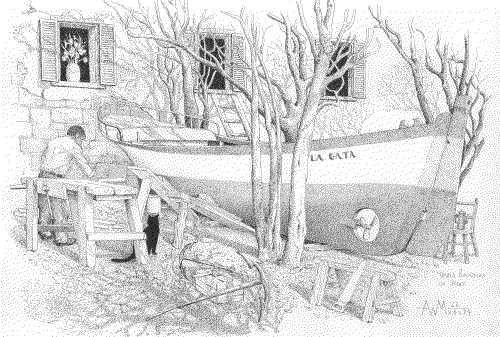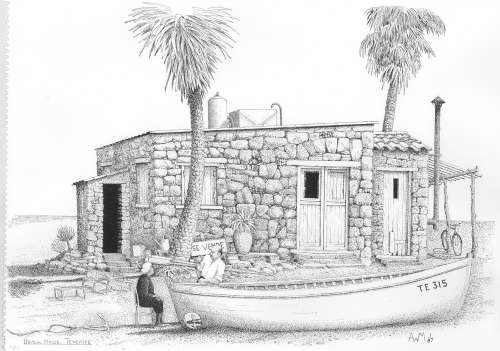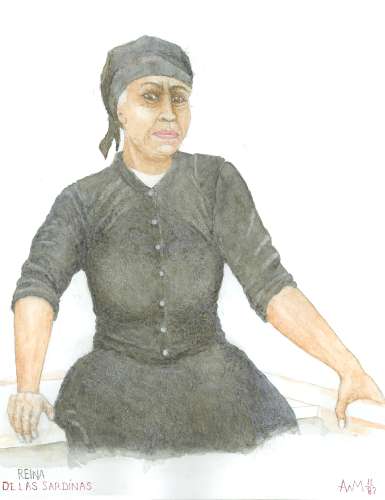
Lori does gardening amongst other things, but mostly gardening. He gardens for some of the older residents including Dick and Jess. Dick has arthritis and finds physical stress painful. Jess does some work around their pretty back garden with a rose trimmer and tidily snips at the short hedge that separates the gardens, but Lori forks the earth, gets the weeds and trims the big hedge at the bottom. Sometimes he joins his cousin Claudio's boat for some sport fishing. And if many rods are booked in, then Lori does mostly fishing, and gardening only occasionally. "I go for Claudio for I have the English," with his usual big grin. Ah, I say, but what if your rods are Aleman? He shrugs, "The Aleman have the English, the Sueco have the English, the Holandes have the English, so there is no problema - but mi madre has no English. I say 'silly old cow' but she does not know that." He has never, as far as we are aware, been married, nor has he ever been the worse for drink. He is a small man with a bellowing laugh, and a rather dark sense of humour, ironic and tending to fatalism. He uses greetings like 'Aiup me duck!' which look strange and sound even stranger coming from the Spanish persona he carries around with him. "No, not Spanish," he insists, "Canaria is to me." Hatred of the Spanish is common to the Canarian people who make no apology for it. "The bastards came with Franco. Some stayed behind to kill people from his army. And they kill people who gave them hidings." 
Lori's cousin, Josef, with his fishing boat, La Gata We don't know how he came by his name though we do know some of his history. As a child he left Tenerife in the bad days of El Dictador. Deserters hiding out in the wild north west of Tenerife were hunted like wild boar and shot by army patrols on detachment from the mainland, and boys who carried messages were sometimes caught and beaten into revealing where deserters were hiding. Lori's father put him on a boat bound for Brazil where, in Recife, there was an aunt on his mother's side who was a teacher in an upper grade school. The aunt arranged for practical lessons in English and got him aboard a big liner. He then found himself cleaning white shoes and black shoes and working as laundry boy and bound for India from where he was enlisted as a junior crew man with the Brocklebank Line, the British India Steamship Company. Very proud of his long association with Brocklebank, is Lori. "This is why mi English so damn good." He lives with his mother in a beach house somewhere behind Casa Del Mar. Beach houses are no longer allowed. There are no toilet facilities, no water supply, some of them have noisy electric generators. No matter how quaint, how charming in their primitive way, they are condemned as insanitary. The walls are stonework, cunningly built in random fashion, the roofs mostly corrugated iron, their shallow gradient weighed down with boulders. If there is a water tank the water wagon will plough across the beach to fill it. Rubbish has to be taken by hand to the nearest basura. Basuras are emptied every night but sometimes there are complaints that the beach residents allow rubbish to accumulate. 
In our early days in Los Cristianos there was an old house in the middle of the newly paved promenade, its floor level was two feet below the promenade level and a retaining wall bad been built round it. Historically it was a beach house until development advanced then surrounding it with paved promenade, boutiques and bars. The owner would sit outside his door reading his newspaper, totally ignoring the holiday crowd staring like owls. But the man was refusing to move until adequate alternative accommodation was offered. Then, suddenly, the little house vanished, the gap in the promenade was tiled over and we had difficulty remembering exactly where the wee house had stood. And now the department for housing wants Lori off the beach and into a nice little apartment in town. But he needs a two bedroom apartment, the one on offer has only one bedroom and he's damned if he will sleep in the salon. "These peoples wait along for mi madre to die. And I will not let this happen." Dr Castillo knows this old lady quite well. Almost every week she is in his waiting room. He does not mind the old soul taking up his time with her aches and pains: "for she is getting the exercise in walking to this place. She will live for ever!" were his words to Lori who related them to us with understandable pride. And this is where the story hangs, unresolved, for we catch shreds of circumstance; the old lady's half forgotten memory of the executions, of many people buried in one pit in the fields around Masca, of the girls kept isolated in the roofs of grain sheds so that they could not be found by soldiers; circumstances kept alive despite the winds of change, for the butcher Franco died only recently and the stink still lingers. But now she has become something of a celebrity. "The people come to see her," says Lori, "and write in the book." "I'm going to see her," says Maeve. "I used to get my fish from her casilla. She must be over ninety now. I'll take her some flowers." "I'll come," says Lizzie. People are signing her book to say they've been to see her, but really they are signing her son's petition for a larger apartment. But even Lori's battles with local government cannot suppress his dark wit. Mostly in his native Spanish he brings roars of laughter from the town quay where he likes to go to smile at the ladies and crack jokes. And there is his red beret. "It belonged to my grandfather," we hear. "To me he gives this, he was a communist. To each according to his needs - I tell them this in the office!" He wears old-fashioned blousy shirts, the sort you pull over your head. "For the warm. The sea is cold." The old lady's fish stall is now occupied by Geralda, a young sprog in her sixties. Geralda is also our sardine lady and trogs around the estates with a large basket of fish on her head. A big woman with a loud voice she is also rather striking in appearance. We hear that voice. She is approaching. I must ask. "You may have to pay her," Lizzie suggests. I might do my usual trick of sketching a few lines then detailing later... Depends on the face. Some faces, delightfully simple, turn out to be the most infuriatingly difficult. The remedy is there but I just don't see it. Lori knows Geralda quite well. He will ask on my behalf. I have never paid anyone to sit for me, I wouldn't know what to offer. "Start with 1000 pesetas," Lizzie suggests, "1000 pesetas per hour." Lori shook his head, "This question not to me. This woman has great voice for disputa, and much persuasion en familie." But I get there first and stop her outside D Bloque. "No, senora, I do not want sardines." She scowls at my imprudence, for what else from her can there be except fish? Under her breath she seeks divine protection, turns on her heel. "Momento senora!" Hastily I signal Bernardo returning from Mas a Menos. "Translacion favor, 'migo." "What's up, dear lad?" His English, spacious and wise by way of compliment to me, has the reverse effect on Geralda who, beset by foreign insults, begins to back away, but is held fast by the mention of pesetas. What do the English want with me, Bernardo says? Tell her I want her to sit for me. It passes into Spanish and Geralda, beginning to laugh, says - I would like to sit for my feet and you will pay my sit? Tell her I give 500 pesetas. She says - for how long do I sit? Tell her half an hour. Her mouth grins widely, Bernardo laughs. She says - many sardines in half an hour make more than this. OK, 1200 I offer. She will accept 1500... "Per hora!" I throw in. 
We nod agreement. Geralda sits on the low wall. A small crowd is gathering. Panic stricken I scoot up to our apartment to gather materials. I didn't mean right now, dammit! I meant a future date and preferably in private, for I positively hate people watching every pencil stroke I make and their comments are unbearable. Even Spanish comments carry a sting and I imagine there to be no compromise about this extranjero who thinks he's Picasso. Actually I get the face pretty good, scribble a note to remind me that her hair beneath the scarf is grey which is silly for photographs can tell me that. OK camera - refuses to click - no film - Shit! So draw the body in graphite. Should be dead easy for she is a cuervo, a street crow, all in black, headscarf, stockings, dress, cardigan, the whole drab outfit enlivened by grubby white trainers, but I'm only going down to waist level, so sod it! Leave the bad lines in, take them out later. Visualise, memorise, hope for a good result... Cobblers! Should have got a film - difference between the amateur and the professional - the amateur hopes it comes out right! - the professional knows it can't go wrong! I lose her for ages while she attends a customer, I don't fidget, just sit quietly fuming, wishing everybody would go away. OK enough. Pencil down, Smile nicely. She comes to see what I have done. Not a word, but I am aware of a large hand tapping me on the shoulder. I fumble around. Jesus! I haven't got 750 pesetas! Bernardo, please! OK no problem. He gives Geralda 750 pesetas for half an hour sit. Her comments bring forth smiles and laughter even from Bernardo. Now she is on her way with her basket, still throwing words over her shoulder, Geralda, queen of the sardine. "She is a woman of words, I tell you," says Lori. "She keep all men to silence." Spluttering with laughter Bernardo explains, "This poor artist, she was saying, begs money to pay the fish lady." Lori's cackling wit will ensure that this story is widely circulated. Only once have I known, or rather heard about, his ebullient spirit being displaced. It was much later in our acquaintance when the police came looking for him. The traumas of early childhood leapt into place and he ran home to his mother. The old lady had enough sense to take him to the police. All they wanted was to question him about the incident on board the migrant vessel when a man was killed. But it reduced Lori to an acrid humbleness of spirit not seen before. "Puercos! Pigs in shit! For me it is mi madre! They kill her with the worry for me. And I did not see this killing. I gave them water. I hate this police pigs!" "Hang about, Lori! The police force is the thin blue line between us and anarchy. And I'm not having anarchy - tell your mum!" He stopped at anarchy. "This word for me, please?" I put it to the word person. A quick flip through Parte Segunda: Ingles-Espanol brought forth Anarquia. "Thanks, Love. Absence of law and order, Lori." "Si. Is plain to compare, this it was enough already, El Dictador marchar! Now there is too small of this." "Well, yes. In Franco's time there was discipline on the streets - when they'd stopped killing each other. Too little of understanding between neighbours, Lori." His puzzled look requires enlightenment, "Vecinos, amigo. Like Bernardo and Berenca to us." "Ah, Si!" We still squeam about an awful moment in the John Bull. A couple across the bar decided to talk to us. We listened, drew nearer. We could feel the heat of their words. They were obviously upset about something - but what? Carefully scrutinising each wordfall, for clues, we looked at them vacantly. "Finnish!" hissed Lizzie. I believe the Finnish language is Hungarian at source, absolutely hopeless for the clueless and insular British. Boldly I took this bull by the horns. "Look, I'm sorry but neither of us understand what you are saying." I said it slowly, not wanting to upset them further. "Where are you from?" I queried. "Wolverhampton, mate!" As soon as he said it we clicked in, making rapid adjustment to fill in those almost closed areas of regional dialect lost by lack of use. Horrified, in shame that we could not recognise our own country-people, we hastened to apologise, but the harm was done. They got up, paid up and went out, muttering noisily about right prats from the south. Over the years our communication feelers have been probing foreign sources and somehow we lost our own plot. I don't remember what it was they were upset about - but we made it worse. "The English do not have the English!" I said to Eugenio who smiled widely, thought the whole thing rather funny. "Bad interpretacion also for I do not comprehend mi suegra - the in-law. She is Catalan. So I get the dog's dinner - Heya! Viva para sempre - the way it is!" "The way it is, indeed!" quoth Lizzie. "Maybe we should go home for a holiday. We can understand you and Lori better than people from Wolverhampton!" | |
